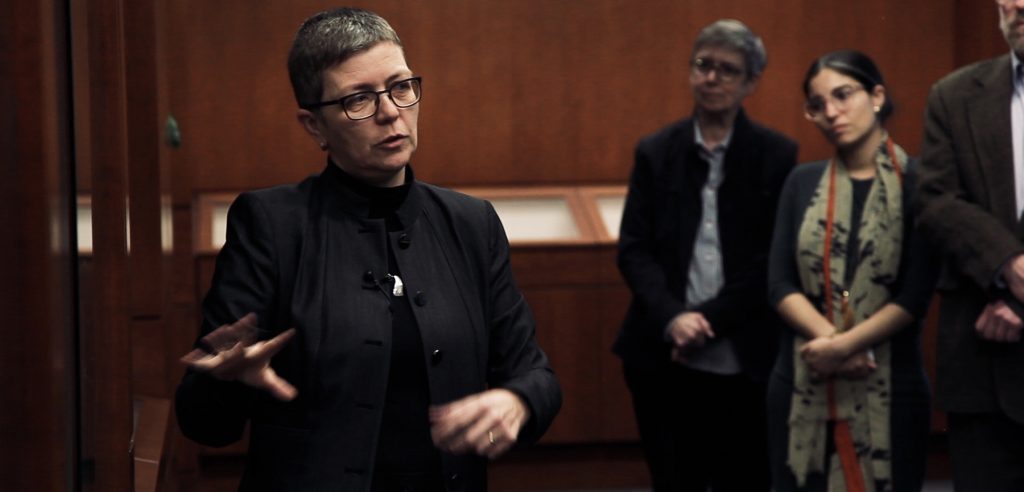
“This is an innovative partnership between two institutions to share resources and promote Jewish scholarship,” said Magda Teter, Ph.D., the Eugene Shvidler Chair in Judaic Studies and professor of history.
Teter said that the two universities were already collaborating at workshops focused on early modern Jewish history, where students from the two schools met at Fordham’s Lincoln Center campus for scholarly discussion.
“This builds on that relationship and deepens the research,” she said.
Scholars in all fields of Jewish studies are encouraged to apply. Applicants must have a thorough command of Hebrew and have earned a doctoral degree sometime between June 2013 and June 2017.
Fellows will be expected to be in residence from September 2017 to May 2018, teach one undergraduate course per semester, give one lecture, and hold a faculty seminar.
This fellowship has been made possible by the Stanley A. and Barbara B. Rabin Postdoctoral Fellowship Fund at Columbia University and the Eugene Shvidler Gift Fund at Fordham University.
The application process is open through January 30, 2017 and can be accessed by writing to [email protected].
]]>
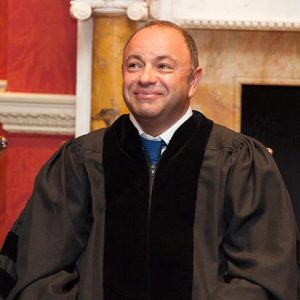
The gift will support Jewish studies at Fordham, and follows a $3 million gift from Shvidler to establish the Shvidler Chair of Judaic Studies in the Department of History in 2013.
“This is an especially timely gift for an exceedingly important purpose,” said Joseph M. McShane, S.J., president of Fordham. “The world is seeing a rise in anti-Semitism unprecedented since the end of World War II. Aside from the great scholarly value of a Center for Jewish Studies, it provides a counterweight to bigotry, and a vehicle for ecumenical connections among two great faiths. We thank Mr. Shvidler for his generosity not just to Fordham, but to the intellectual community of which it is a part.”
Eugene Shvidler, a trained mathematician, a noted winemaker, an oil executive, and international philanthropist, was awarded an honorary Doctor of Humane Letters degree—the University’s highest honor—in September 2015. He is the chairman of Millhouse LLC, an investment and asset management company. He is also the chairman of Highland Gold Mining Ltd, and is a member of the board of Evraz plc and AFC Energy plc. He was previously CEO of Sibneft, one of the major Russian oil companies.
“I commend Fordham’s vision in establishing the Center for Jewish Studies,” Eugene Shvidler said. “In supporting the program, I hope to enrich and deepen the understanding of the faith, history, and culture of the Jewish people.”
Born in the U.S.S.R., Shvidler received a master’s degree in mathematics from the Gubkin Institute of Petrochemicals and Natural Gas as well as his graduate degrees from the Gabelli School.
]]>The program will seek to understand Jewish history and culture within the larger framework of Jews’ interaction with other religions, particularly among Jews and Christians. It will further strengthen Fordham’s commitment to the Jewish studies program, which came into its own after Eugene Shvilder made a generous gift to establish a named chair in 2013.
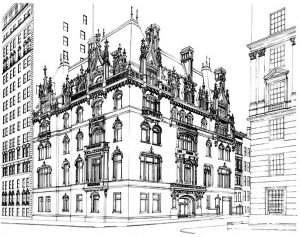
Magda Teter, PhD, the Shvidler Chair in Judaic Studies and professor of history, described the new minor as “very robust.”
“’There are more than 10 members of the faculty who can cover all areas of Jewish history from antiquity to modern United States, Israel, and Europe,” said Teter.
Stephen Freedman, PhD, provost of the University, said what makes Fordham distinct among Jewish studies programs in New York City is “that we are a Jesuit institution.”
“Studying Jewish culture and Jewish themes is a way for all of us to understand our own traditions,” said Freedman. “In these explorations of differences you bring out the value and the similarities, and by exploring them you respect them.”
“There is so much shared tradition and an amazing amount of overlap.”
In another unique arrangement, all of the University’s Jewish studies students will have free access to the Jewish Museum of New York and the Museum of Jewish Heritage—A Living Memorial to the Holocaust. Many of the museums’ exhibitions and programs will be woven into the coursework, said Teter.
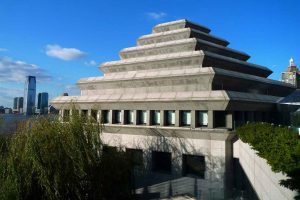
“We are honored to establish a partnership with Fordham and are excited about potential collaborative projects,” said Elizabeth Edelstein, director of education at the Museum of Jewish Heritage.
In addition to the new minor, Teter said that the Jewish studies program has received two grants from the American Academy for Jewish Research, where she was inducted as a fellow. The grants will support two collaborative projects between Fordham faculty and faculty from other New York City institutions.
One grant will support a working group, titled “Interdisciplinary Approaches to Jewish Orthodoxies, Society and Culture,” and will be led by Ayala Fader, PhD, associate professor of anthropology, and Isaac Bleaman, a doctoral candidate at New York University. The group is geared toward research on contemporary Jewish Orthodoxies, with an emphasis on North America, said Teter. The second grant will go toward an early modern workshop that will focus on working with primary sources via an interactive seminar format. Both groups will meet regularly at Fordham in the 2016-2017 academic year.
A series of public lectures on Jewish themes will be announced at summer’s end that will bring leading scholars from around the globe to campus.
“When we develop a minor such as this, it’s a first step to something broader and much more programmatic,” said Freedman. “Students will be able build out from these relationships, beyond the University and beyond New York.”
]]>
The series features high-profile scholars from both the United States and abroad, including Israel and Poland, said Magda Teter, PhD, the Shvidler Chair in Judaic Studies. There are two notable lectures in March to be held at Fordham Law.
.
“We’ll be covering a diverse range of topics—from north African Jewish communities to contemporary museum interpretations,” she said.
On Wed., March 2 at 6:30 p.m., award-winning authors Marc Epstein, PhD, professor of religion at Vassar College, and Sara Lipton, PhD, professor of history at the State University of New York at Stony Brook, will participate in “Jews in Medieval Art: A View From the Inside and Outside.” The scholars will look closely at the medieval origins of anti-Jewish iconography.
Lipton has researched how medieval Christians’ manner of worshiping the suffering Christ led to negative portrayals of Jews in art, said Teter. Epstein has studied how Jewish art and iconography are complicated because of an “ostensible biblical prohibition against visual representations.” Epstein’s work, like those of other scholars whose work focuses on Jewish art, contradicts the perception that Jews did not represent themselves in art.
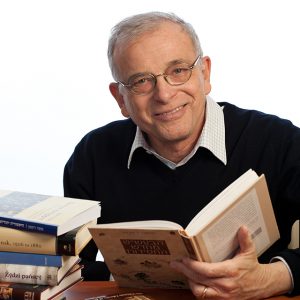
On Mon., March 14, at 5:30 p.m., Moshe Rosman, PhD, professor of history at Bar Ilan University in Israel, will discuss how contemporary Jewish museums interpret the Jewish story in the age of smartphones and the trend at contemporary history museums to eschew artifacts in favor of multimedia, said Teter. In “How to Tell the Story: Jewish Museums, Jewish History, Jewish Metahistory,” Rosman will analyze five Jewish historical museums.
Teter said that Rosman has changed the study of Eastern European history in Poland by promoting the study of Jewish history in tandem with the nation’s economic history, as they are both “interdependent stories.”
He also revolutionized the study of Hasidism, she said. The scholarly field was solely dependent on Jewish sources until Rosman included research from the Polish state archive.
“He entirely changed the way we see how Hasidism is organized,” she said.
]]>